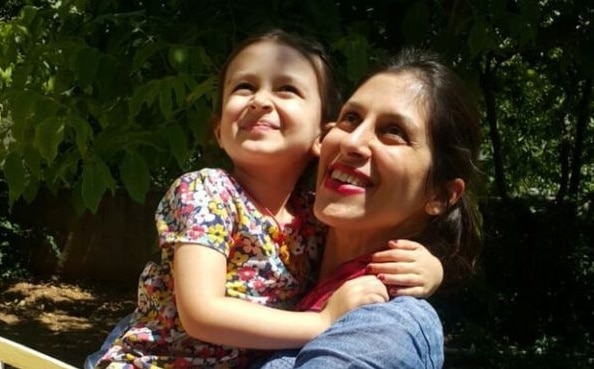Iran’s regime has launched another propaganda campaign against Anglo-Iranian political prisoner Nazanin Zaghari-Ratcliffe, days after she announced that she will go on hunger strike.
Iranian State TV broadcast a “documentary” comparing Russian influence in the 2016 US Presidential election with allegations that the British Broadcasting Corporation sought to influence Iranian domestic policy in pursuit of regime change.
The program then turned to Zaghari-Ratcliffe, seized in April 2016 and sentenced to five years in prison for espionage. At the time of her arrest, she was a charity worker for the Thomson Reuters Foundation; however, just after mass protests in Iran following the disputed 2009 Presidential election, she was an administrator for BBC Media Action, which trains journalists overseas.
The Iranian “documentary” said Zaghari-Ratcliffe was involved with a project called ZigZag, labelling it “one of the most important soft war projects by the UK against the Islamic Republic”. Targeting BBC Persian — whose staff have long been harassed and their relatives threatened by regime authorities — the film said ZigZag was to “educate anti-revolutionary forces”.
ZigZag was launched by the BBC World Service Trust in 2006 for journalism development. It lasted until 2010.
In another attempt to link Zaghari-Ratcliffe to espionage, the program spoke of the punishment in 2014 of employees of the technology website Narenji (Orange), based in Kerman in southern Iran. At least one of the detainees, all given lengthy sentences, was reportedly a ZigZag trainee.
The prosecutor in Kerman, Yadollah Movahed, claimed in 2016 that Zaghari-Ratcliffe was a member of “one of the groups that during the Sedition [protests in 2009] conducted activities against the security of the country by designing websites and carrying out campaigns in the media”.
At one point, Zaghari-Ratcliffe was transferred to detention in Kerman, spending months there before being transferred back to Tehran’s Evin Prison.
While with BBC Media Action, Zaghari-Ratcliffe was an administrator with its Training Station. The documentary converted this role into that of a trainer of journalists for subversion. It claimed that the Training Station was funded by the UK Foreign Office, with Zaghari-Ratcliffe paid $11,000 per month.
The program also targeted Mahmoud Enayat, the director of London-based nonprofit Small Media, which works to “increase the flow of information in closed societies”. The Iranians portrayed Small Media as “the headquarters” of anti-revolutionary forces and sites.
Why Now?
No evidence was presented publicly against Zaghari-Ratcliffe at the time of her arrest and sentencing. In late 2017, amid pressure from British officials for her release, Iranian authorities countered with threats to extend her prison term from 5 years to as long as 16 years. State media backed the threat with a program presenting e-mails and pay stubs from Zaghari-Ratcliffe’s time with the BBC — the material, which merely pointed to her administrative role, was converted into proof of her supposed direction of the subversive journalists.
Last week Zaghari-Ratcliffe and Iranian human rights activist Narges Mohammadi announced a three-day hunger strike, from January 14 to 16, to protest denial of access to medical care. They wrote, “In the event of the authority’s failure to address these concerns and them further endangering our health, we will take further action.”
Zaghari-Ratcliffe’s husband Richard Ratcliffe said his wife has been refused medical treatment for lumps in her breasts, neck pain, and numbness in her arms and legs. She has also been barred from seeing an outside psychiatrist, despite approval by a prison doctor.
Last week Iran Daily, Jan 7: Anglo-Iranian Political Prisoner Zaghari-Ratcliffe to Go on Hunger Strike
Mohammadi, vice president of the Center for Defenders of Human Rights, is serving a 16-year sentence for her role in the CDHR and for “establishing and running the illegal splinter group Legam”, which campaigns for the abolition of Iran’s death penalty.
She has suffered from recurrent serious health problems.
Some Iranians have speculated on social media that the new “documentary” is an effort by hardliners to dissuade dual nationals from returning to Iran. Others suggest that the full series, which denounces other dual nationals and “subversive elements” is part of a campaign by the Iranian authorities to justify the arrests of bloggers and journalists.

